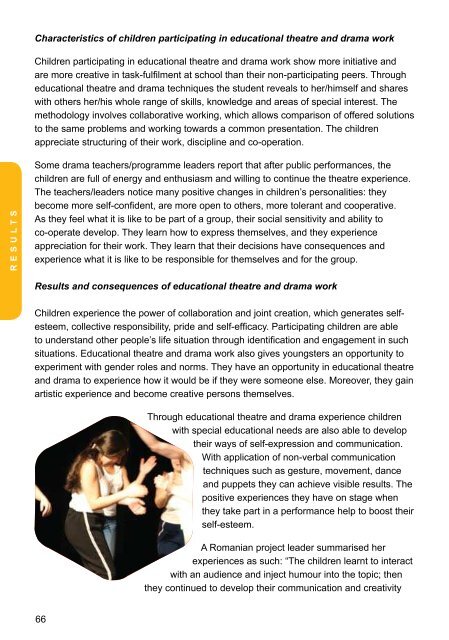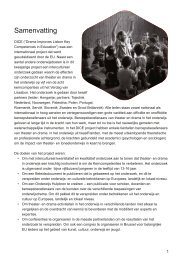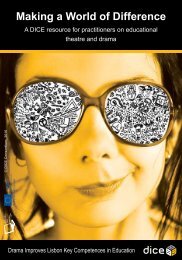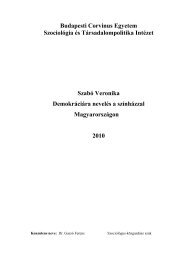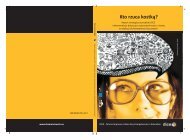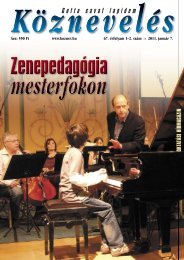Policy Paper - Drama Improves Lisbon Key Competences in Education
Policy Paper - Drama Improves Lisbon Key Competences in Education
Policy Paper - Drama Improves Lisbon Key Competences in Education
Create successful ePaper yourself
Turn your PDF publications into a flip-book with our unique Google optimized e-Paper software.
R e s u l t s<br />
Characteristics of children participat<strong>in</strong>g <strong>in</strong> educational theatre and drama work<br />
Children participat<strong>in</strong>g <strong>in</strong> educational theatre and drama work show more <strong>in</strong>itiative and<br />
are more creative <strong>in</strong> task-fulfilment at school than their non-participat<strong>in</strong>g peers. Through<br />
educational theatre and drama techniques the student reveals to her/himself and shares<br />
with others her/his whole range of skills, knowledge and areas of special <strong>in</strong>terest. The<br />
methodology <strong>in</strong>volves collaborative work<strong>in</strong>g, which allows comparison of offered solutions<br />
to the same problems and work<strong>in</strong>g towards a common presentation. The children<br />
appreciate structur<strong>in</strong>g of their work, discipl<strong>in</strong>e and co-operation.<br />
Some drama teachers/programme leaders report that after public performances, the<br />
children are full of energy and enthusiasm and will<strong>in</strong>g to cont<strong>in</strong>ue the theatre experience.<br />
The teachers/leaders notice many positive changes <strong>in</strong> children’s personalities: they<br />
become more self-confident, are more open to others, more tolerant and cooperative.<br />
As they feel what it is like to be part of a group, their social sensitivity and ability to<br />
co-operate develop. They learn how to express themselves, and they experience<br />
appreciation for their work. They learn that their decisions have consequences and<br />
experience what it is like to be responsible for themselves and for the group.<br />
Results and consequences of educational theatre and drama work<br />
skills. We get to express ourselves creatively by play<strong>in</strong>g together. Teams resolve conflicts<br />
and work more productively. The teachers state that workshop participants reta<strong>in</strong> more of<br />
the <strong>in</strong>formation they dissem<strong>in</strong>ate, and head teachers report <strong>in</strong>creased levels of comfort<br />
and effectiveness. In addition, the vocabulary and activities that we have developed for<br />
creat<strong>in</strong>g collaboratively are especially useful <strong>in</strong> schools.”<br />
Dissem<strong>in</strong>ation of results: national and <strong>in</strong>ternational tours<br />
<strong>Education</strong>al theatre and drama activities are usually held <strong>in</strong> primary, lower and upper<br />
secondary schools, and students can work <strong>in</strong> one-occasion groups or <strong>in</strong> groups provid<strong>in</strong>g<br />
cont<strong>in</strong>uous work. Some of the cont<strong>in</strong>uous groups are organised <strong>in</strong> order to create a short<br />
performance for school events, or for regional theatre meet<strong>in</strong>gs or festivals; with some<br />
groups regularly participat<strong>in</strong>g <strong>in</strong> national children’s theatre festivals or youth theatre<br />
festivals.<br />
Some educational theatre and drama groups try to support youth exchanges with<strong>in</strong> both<br />
European and non-European countries. While the objectives of these youth exchanges may<br />
differ, the ma<strong>in</strong> aim is to enable young people to socialise with each other through theatre<br />
activities. The same reasons are also mentioned by those teachers and group leaders who<br />
try to motivate and support the participation of their students <strong>in</strong> <strong>in</strong>ternational theatre festivals.<br />
R e s u l t s<br />
Children experience the power of collaboration and jo<strong>in</strong>t creation, which generates selfesteem,<br />
collective responsibility, pride and self-efficacy. Participat<strong>in</strong>g children are able<br />
to understand other people’s life situation through identification and engagement <strong>in</strong> such<br />
situations. <strong>Education</strong>al theatre and drama work also gives youngsters an opportunity to<br />
experiment with gender roles and norms. They have an opportunity <strong>in</strong> educational theatre<br />
and drama to experience how it would be if they were someone else. Moreover, they ga<strong>in</strong><br />
artistic experience and become creative persons themselves.<br />
Through educational theatre and drama experience children<br />
with special educational needs are also able to develop<br />
their ways of self-expression and communication.<br />
With application of non-verbal communication<br />
techniques such as gesture, movement, dance<br />
and puppets they can achieve visible results. The<br />
positive experiences they have on stage when<br />
they take part <strong>in</strong> a performance help to boost their<br />
self-esteem.<br />
A Romanian project leader summarised her<br />
experiences as such: “The children learnt to <strong>in</strong>teract<br />
with an audience and <strong>in</strong>ject humour <strong>in</strong>to the topic; then<br />
they cont<strong>in</strong>ued to develop their communication and creativity<br />
Country<br />
Czech<br />
Republic<br />
Hungary<br />
Netherlands<br />
Specific examples<br />
of aims of<br />
educational theatre<br />
and drama work<br />
Develop senses, cooperation,<br />
and<br />
skills of enter<strong>in</strong>g a<br />
role;<br />
accept the rules of<br />
games; develop<br />
evaluation skills<br />
Develop social and<br />
civic competences<br />
(e.g. tolerance,<br />
empathy), and<br />
communication skills;<br />
strengthen group<br />
cohesion<br />
Stimulate children<br />
to stand up firmly for<br />
themselves, and to<br />
be connected with<br />
each other; <strong>in</strong>crease<br />
self-confidence;<br />
develop ability to<br />
take the <strong>in</strong>itiative<br />
Specific examples of<br />
focus of educational<br />
theatre and drama<br />
work<br />
Experienc<strong>in</strong>g various<br />
types of <strong>in</strong>terpersonal<br />
communication;<br />
learn<strong>in</strong>g how to<br />
cooperate and to work<br />
on collective projects<br />
Th<strong>in</strong>k<strong>in</strong>g about moral<br />
and social concepts<br />
(e.g. responsibility,<br />
freedom) and issues<br />
(e.g. communication<br />
<strong>in</strong>side the family);<br />
handl<strong>in</strong>g conflicts;<br />
<strong>in</strong>creas<strong>in</strong>g self-reliance<br />
Learn<strong>in</strong>g to be able<br />
to show one’s own<br />
<strong>in</strong>dividuality; teachers<br />
help<strong>in</strong>g children to<br />
trust that whatever<br />
they play, it is correct<br />
Specific examples of methods used<br />
Expression by gesture, movement,<br />
proximity, posture, pantomime, still image,<br />
work with stories, performance by visit<strong>in</strong>g<br />
theatre company, story fabulation, role play,<br />
dramatisation of short text, evaluation of the<br />
work, self-evaluation<br />
Role games, theatre <strong>in</strong> education<br />
programmes, drama <strong>in</strong> education<br />
programmes, discussion reflect<strong>in</strong>g on the<br />
programme with the participants, discussion<br />
reflect<strong>in</strong>g on the programme with the<br />
teachers, improvisation, skills development,<br />
rehearsals, creat<strong>in</strong>g performances, festivals,<br />
tour<strong>in</strong>g<br />
The play is created <strong>in</strong> an improvisational<br />
process that starts with theatrical<br />
improvisations based on the players’ own<br />
experiences of group pressure and want<strong>in</strong>g<br />
to be part of a group (sense of belong<strong>in</strong>g)<br />
and what effect this has/had on them.<br />
Improvisational experiential research was<br />
done based on frustration, the feel<strong>in</strong>g of<br />
safety and the feel<strong>in</strong>g of be<strong>in</strong>g part of a<br />
group as a part of your identity<br />
66<br />
67


